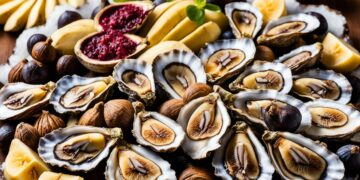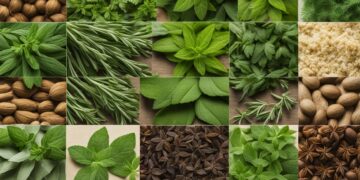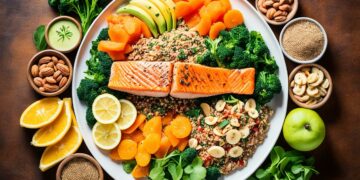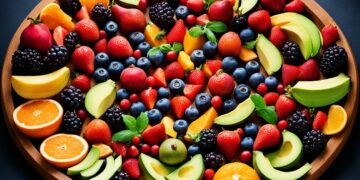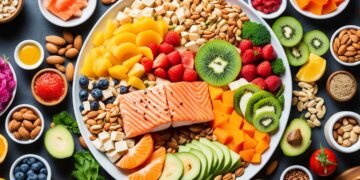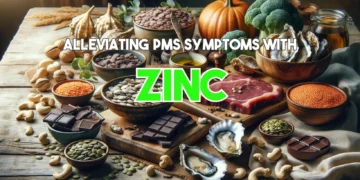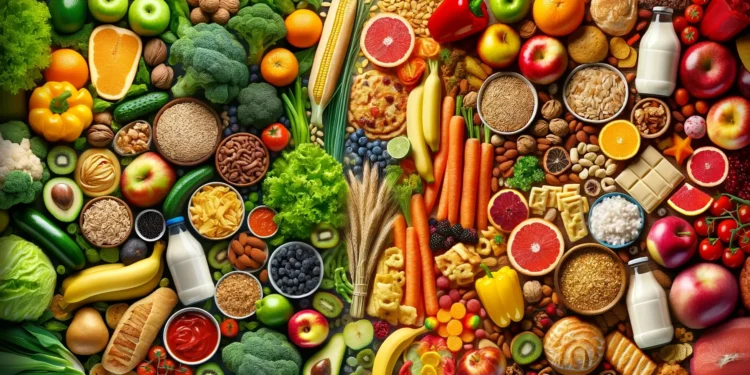When it comes to making healthy choices, the type of food we consume plays a crucial role. In today’s fast-paced world, convenience often leads us towards processed foods that are quick and easy to prepare. However, the impact of such choices on our health cannot be ignored.
Processed foods, including frozen meals and boxed products, are highly processed and often contain a long list of unhealthy ingredients. They tend to be higher in calories, fat, salt, and added sugars, while lacking the essential nutrients our bodies need.
On the other hand, real food, also known as whole foods or unprocessed foods, offers a multitude of health benefits. These foods are minimally processed, allowing them to retain their natural goodness and nutrient content. By choosing real foods, we give our bodies the nourishment they need to thrive.
So, what exactly is the difference between real food and processed food? Real food is fresh and natural, while processed food has undergone extensive processing, often involving the addition of artificial ingredients and preservatives.
Real food is rich in essential nutrients like fiber, vitamins, and minerals, while processed food tends to be lacking in these key nutrients.
As more people become aware of the importance of healthy eating, terms like “clean eating” and “organic vs processed” have gained popularity. Clean eating emphasizes the consumption of minimally processed foods, while organic foods are grown without the use of artificial pesticides or fertilizers. By opting for real food, we prioritize our health and well-being.
Key Takeaways:
- Processed foods are highly processed and often contain unhealthy ingredients like added sugars and artificial additives.
- Real food, also known as whole foods or unprocessed foods, retains its natural nutrient content and offers numerous health benefits.
- Eating real food can provide our bodies with essential nutrients like fiber, vitamins, and minerals.
- Clean eating emphasizes the consumption of minimally processed foods to support a healthy lifestyle.
- Choosing real food over processed food is a step towards better overall health and well-being.
What are Highly Processed Foods?
Highly processed foods are a category of foods that have undergone extensive processing and typically contain very few or no minimally processed or unprocessed ingredients.
These foods often go through multiple stages of processing, which involve the addition of various additives, preservatives, flavorings, and artificial ingredients.
The NOVA classification system, a framework used to categorize different types of foods based on the extent of processing, classifies highly processed foods as ultra-processed.
Ultra-processed foods are the most heavily processed category according to the NOVA classification and are typically low in nutritional value. They often contain excessive amounts of added sugars, unhealthy fats, and high levels of sodium. These foods are usually convenience items, such as processed snacks, sugary beverages, and ready-to-eat meals.
It’s important to note that not all processed foods are highly processed. There are also minimally processed foods that undergo minimal processing methods, such as washing, cutting, or packaging, while retaining most of their original properties and nutrients.
Examples of minimally processed foods include pre-cut vegetables, roasted nuts, or frozen fruits without added sugars.
“Highly processed foods are a result of extensive industrialization and often lack the essential nutrients found in unprocessed or minimally processed foods.”
The consumption of highly processed foods has become prevalent in modern diets due to their convenience and availability. However, studies have linked the frequent consumption of highly processed foods to an increased risk of various chronic diseases, such as obesity, heart disease, and type 2 diabetes.
These foods are typically energy-dense but nutrient-poor, meaning they provide excessive calories without adequate essential nutrients such as fiber, vitamins, and minerals.
Illustrative Table:
| Type of Food | Examples | Description |
|---|---|---|
| Unprocessed Foods | Fresh fruits, vegetables, legumes, whole grains, lean meats | Foods that are in their natural state without any modifications or processing |
| Minimally Processed Foods | Pre-cut vegetables, roasted nuts, frozen fruits without added sugars | Foods that undergo minimal processing methods while retaining most of their original properties and nutrients |
| Processed Foods | Canned vegetables, packaged bread, cheese | Foods that have undergone some level of processing, such as washing, cutting, heating, or packaging |
| Highly Processed Foods (Ultra-processed) | Sugary beverages, processed snacks, ready-to-eat meals | Foods that have undergone extensive processing, often containing additives, preservatives, flavorings, and artificial ingredients |
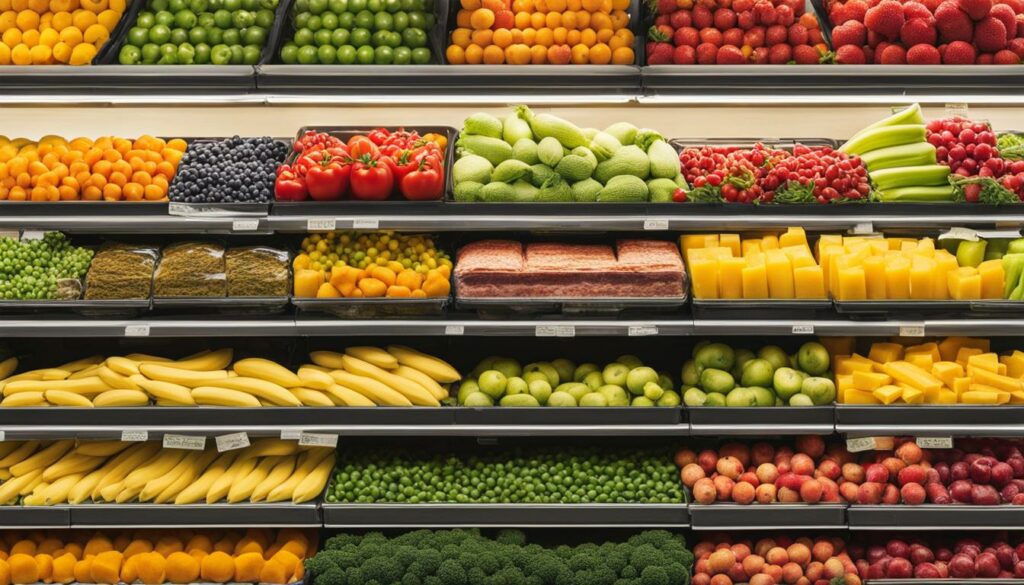
What are Considered Healthy Foods?
When it comes to maintaining a healthy diet, opting for unprocessed or minimally processed foods is key. These foods are packed with essential nutrients and offer numerous health benefits. Commonly known as whole foods, they are celebrated for their high nutrient content and minimal additives.
Here are some examples of healthy foods that you can incorporate into your diet:
- Fruits and vegetables: Rich in vitamins, minerals, and antioxidants, fruits and vegetables are essential for a balanced diet. They provide important nutrients, support healthy digestion, and help reduce the risk of chronic diseases.
- Whole grains: Whole grains such as quinoa, brown rice, and whole wheat bread are excellent sources of fiber, B vitamins, and minerals. They promote digestive health, help control blood sugar levels, and contribute to heart health.
- Lean proteins: Foods like chicken, fish, beans, and tofu are great sources of lean proteins. They are low in saturated fats and provide essential amino acids for cell repair and growth.
- Dairy products: Dairy products like yogurt, milk, and cheese are rich in calcium, protein, and vitamin D. They promote bone health and improve muscle function.
- Healthy oils: Incorporating healthy oils like olive oil, avocado oil, and coconut oil into your diet provides essential fatty acids, which support brain function and heart health.
By focusing on these nutrient-dense foods, you can nourish your body and support overall well-being. Prioritize whole foods whenever possible, and limit the intake of processed foods to maintain a healthy and balanced diet.
| Category | Examples |
|---|---|
| Fruits | Apples, bananas, oranges, berries |
| Vegetables | Broccoli, spinach, carrots, peppers |
| Whole Grains | Quinoa, brown rice, whole wheat bread |
| Lean Proteins | Chicken, fish, beans, tofu |
| Dairy | Yogurt, milk, cheese |
| Healthy Oils | Olive oil, avocado oil, coconut oil |
Main Differences Between Processed and Highly Processed Foods
When it comes to food, understanding the differences between processed and highly processed foods is crucial for making informed choices about our diet.
While both types of food undergo some level of processing, highly processed foods are significantly more modified and often contain additives that can affect their nutritional value. Let’s explore the main contrasts between processed and highly processed foods.
Processed Foods:
Processed foods refer to foods that have undergone minimal processing, such as washing, cutting, heating, or packaging. Examples include pre-cut fruits and vegetables or canned beans. While some nutrients may be lost during processing, processed foods can still retain their nutritional value to some extent.
Processed foods typically have a longer shelf life due to preservation methods, such as refrigeration or canning. They often provide convenience with ready-to-eat options or easy-to-cook meals. However, it is essential to note that not all processed foods are unhealthy.
Some minimally processed foods, like frozen fruits and vegetables, can still be part of a balanced diet.
Highly Processed Foods:
Highly processed foods, on the other hand, undergo extensive processing and contain very few or no minimally processed or unprocessed ingredients. They are often loaded with added sugars, salt, and fats, which can contribute to an unhealthy diet if consumed in excess.
Highly processed foods include popular items like sugary cereals, packaged snacks, fast food, and frozen meals. These foods are typically low in fiber, vitamins, and minerals, and may lack the nutritional value found in minimally processed or unprocessed foods.
To illustrate the differences between processed and highly processed foods, let’s take a look at a table showcasing key nutritional components:
| Processed Foods | Highly Processed Foods | |
|---|---|---|
| Calories | Varies, depending on the food type | Can be high due to added sugars and fats |
| Sugar | May contain natural sugars | Often high in added sugars |
| Fiber | Can be present in whole grain products | Typically low in fiber |
| Vitamins and Minerals | Varies, depending on the food type | Generally lower compared to minimally processed or unprocessed foods |
| Salt | May contain moderate amounts | Can be high due to added salt |
| Fat | Varies, depending on the food type | Can be high due to added fats or frying methods |
As seen in the table, highly processed foods tend to be higher in calories, added sugars, salt, and fats, while being lower in fiber, vitamins, and minerals compared to minimally processed or unprocessed foods. Being aware of these differences can help us make healthier choices and prioritize nutrient-dense options in our diet.
Now that we understand the distinctions between processed and highly processed foods, let’s explore the health implications of consuming ultra-processed foods in the next section.
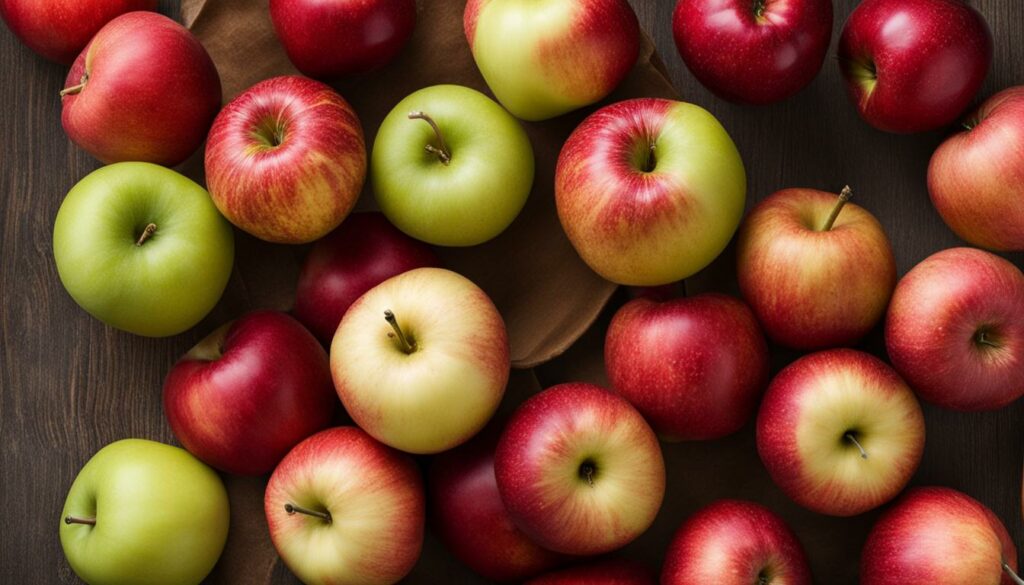
Health Implications of Ultra-Processed Foods
Regular consumption of ultra-processed foods can have significant health implications. These heavily processed food products are often high in added sugars, sodium, saturated fats, and trans fats, while lacking essential nutrients like fiber, vitamins, and minerals.
The excessive intake of these harmful ingredients can contribute to the development of various chronic diseases, such as heart disease, diabetes, and obesity.
Ultra-processed foods are notorious for their high content of added sugars. These added sugars provide empty calories without any significant nutritional value, leading to weight gain and an increased risk of obesity.
Overconsumption of added sugars has also been linked to an elevated risk of developing chronic conditions like type 2 diabetes.
In addition to added sugars, ultra-processed foods are often loaded with sodium. The excessive intake of sodium can raise blood pressure and increase the risk of cardiovascular diseases, including heart disease and stroke.
Saturated fats and trans fats, commonly found in ultra-processed foods, are known to raise cholesterol levels and increase the risk of heart disease. These unhealthy fats can clog arteries, leading to cardiovascular problems over time.
Furthermore, ultra-processed foods are typically low in essential nutrients like fiber, vitamins, and minerals. Diets lacking in these vital nutrients can result in nutrient deficiencies, compromising overall health and well-being.
Overall, the consumption of ultra-processed foods contributes to an imbalanced diet that is deficient in essential nutrients and promotes the development of chronic diseases.
To maintain optimal health, it is crucial to limit the intake of ultra-processed foods and prioritize a diet rich in whole, unprocessed or minimally processed foods that provide the necessary nutrients for a healthy body.
| Health Implications of Ultra-Processed Foods | Associated Health Risks |
|---|---|
| High in added sugars | Weight gain, obesity, increased risk of type 2 diabetes |
| Elevated sodium content | High blood pressure, increased risk of cardiovascular diseases |
| Abundance of saturated fats and trans fats | Elevated cholesterol levels, increased risk of heart disease |
| Lacking in essential nutrients | Nutrient deficiencies, compromised overall health |
Reducing the consumption of ultra-processed foods and opting for nutrient-dense alternatives is crucial for promoting a healthy lifestyle and preventing chronic diseases.
Conclusion
In conclusion, making healthy choices by incorporating real food into your diet is essential for promoting overall health and well-being. By prioritizing whole, unprocessed, or minimally processed foods, you can ensure that your meals are nutrient-dense and provide the necessary vitamins, minerals, and fiber your body needs.
A balanced diet that focuses on real food rather than highly processed options can help reduce the risk of chronic diseases such as heart disease, diabetes, and obesity.
By avoiding ultra-processed foods that are high in added sugars, sodium, and unhealthy fats, you can maintain better control over your calorie intake and support a healthy weight.
It’s important to remember that real food is not only beneficial for your physical health but also for your mental well-being. The high nutrient content in whole foods can enhance brain function and support optimal cognitive performance.
Additionally, choosing real food can contribute to a more sustainable lifestyle, as it often aligns with organic farming practices and reduces environmental impact.
Incorporating real food into your daily meals may require some planning and preparation, but the long-term benefits are worth it. By adopting a nutrient-dense diet centered around whole foods, you can enjoy improved energy levels, better digestion, and overall enhanced vitality.
Embrace the power of real food and make the healthy choice for a balanced and nourishing diet.
FAQ
What is the difference between real food and processed food?
Real food refers to unprocessed or minimally processed foods that are rich in nutrients and offer numerous health benefits. Processed food, on the other hand, has undergone some level of processing and may contain additives, preservatives, and artificial ingredients.
What are highly processed foods?
Highly processed foods are foods that have undergone extensive processing and contain very few or no minimally processed or unprocessed ingredients. They often contain additives, preservatives, flavorings, and artificial ingredients.
What are considered healthy foods?
Healthy foods refer to unprocessed or minimally processed foods that are nutrient-dense and offer various health benefits. Examples include fruits, vegetables, whole grains, lean proteins, dairy products, and healthy oils.
What is the main difference between processed and highly processed foods?
Processed foods have undergone some level of processing, such as washing, cutting, heating, or packaging. They may still retain some nutritional value. Highly processed foods, however, are heavily processed and often contain added sugars, salt, and fats, while being lower in fiber, vitamins, and minerals.
What are the health implications of consuming ultra-processed foods?
Regular consumption of ultra-processed foods is associated with an increased risk of chronic diseases like heart disease, diabetes, and obesity. These foods are often high in added sugars, sodium, saturated fats, and trans fats, while being low in essential nutrients like fiber, vitamins, and minerals.
Why is it important to prioritize real food over processed foods?
Real food, such as unprocessed or minimally processed foods, is nutrient-dense and offers numerous health benefits. Choosing whole foods over processed options can contribute to better overall health and reduce the risk of chronic diseases.


